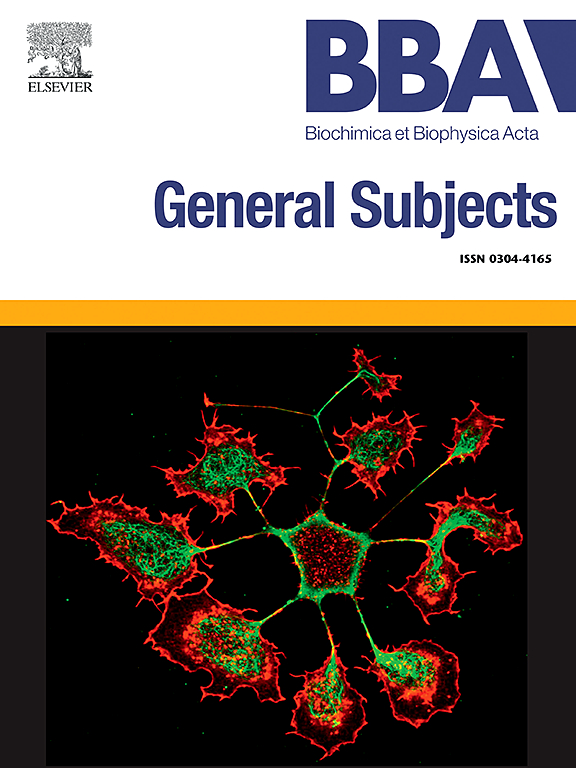蛋白磷酸酶4抑制蛋白的缺失导致基因组不稳定,增加了对复制应激的易感性
IF 2.2
3区 生物学
Q3 BIOCHEMISTRY & MOLECULAR BIOLOGY
Biochimica et biophysica acta. General subjects
Pub Date : 2025-03-27
DOI:10.1016/j.bbagen.2025.130797
引用次数: 0
摘要
蛋白磷酸酶4抑制蛋白(Protein phosphatase 4 inhibitory Protein, PP4IP)近年来在细胞过程中扮演重要角色,特别是在DNA双链断裂修复和端粒维持中,尽管对其功能的研究仍然有限。为了进一步研究涉及PP4IP的细胞通路,我们通过RNA测序对PP4IP敲除细胞进行转录组学分析,观察到p21表达上调。在缺乏PP4IP的情况下,这种上调与p21阳性g1期细胞数量增加有关。先前的研究表明,母细胞中未解决的未充分复制的DNA传递给子细胞,可以触发以p21表达和p53结合蛋白1 (53BP1)核体形成为特征的静止G1期。与此一致,我们发现与对照组相比,pp4ip敲除细胞中53BP1核小体阳性G1细胞的比例更高。此外,pp4ip缺陷细胞显示后期桥的发生率增加-表明DNA复制不完整-没有相应的滞后染色体增加。此外,pp4ip敲除细胞对复制胁迫表现出更高的易感性,正如复制胁迫诱导的染色单体断裂频率升高和对这种胁迫的敏感性增加所证明的那样。总之,这些结果表明PP4IP在保护细胞免受复制应激和确保基因组稳定性方面起着关键作用。本文章由计算机程序翻译,如有差异,请以英文原文为准。

Loss of protein phosphatase 4 inhibitory protein leads to genomic instability and heightens vulnerability to replication stress
Protein phosphatase 4 inhibitory protein (PP4IP) has recently emerged as a key player in cellular processes, particularly in DNA double-strand break repair and telomere maintenance, although research on its functions remains limited. To further investigate the cellular pathways involving PP4IP, we conducted transcriptomic analysis via RNA sequencing in PP4IP-knockout cells and observed an upregulation of p21 expression. This upregulation was linked to an increased population of p21-positive G1-phase cells in the absence of PP4IP. Prior studies have suggested that unresolved under-replicated DNA in mother cells, transmitted to daughter cells, can trigger a quiescent G1 phase characterized by p21 expression and the formation of p53-binding protein 1 (53BP1) nuclear bodies. Consistent with this, we found a higher proportion of 53BP1 nuclear bodies-positive G1 cells in PP4IP-knockout cells compared to controls. Additionally, PP4IP-deficient cells displayed an increased occurrence of anaphase bridges—indicative of incomplete DNA replication—without a corresponding increase in lagging chromosomes. Furthermore, PP4IP-knockout cells exhibited a heightened susceptibility to replication stress, as evidenced by an elevated frequency of replication stress-induced chromatid breaks and increased sensitivity to such stress. Collectively, these results suggest that PP4IP plays a critical role in safeguarding cells from replication stress and ensuring genomic stability.
求助全文
通过发布文献求助,成功后即可免费获取论文全文。
去求助
来源期刊

Biochimica et biophysica acta. General subjects
生物-生化与分子生物学
CiteScore
6.40
自引率
0.00%
发文量
139
审稿时长
30 days
期刊介绍:
BBA General Subjects accepts for submission either original, hypothesis-driven studies or reviews covering subjects in biochemistry and biophysics that are considered to have general interest for a wide audience. Manuscripts with interdisciplinary approaches are especially encouraged.
 求助内容:
求助内容: 应助结果提醒方式:
应助结果提醒方式:


